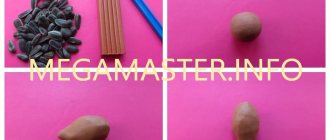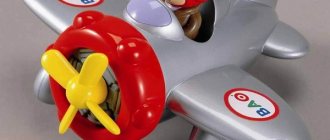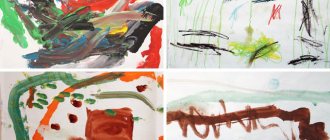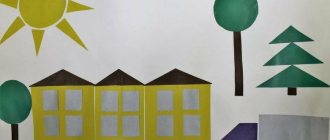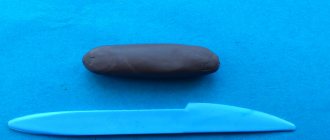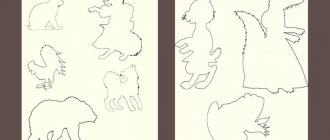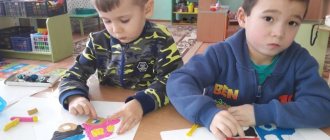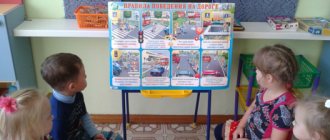Crafts traffic rules: 3 options to choose from
To make a visual aid for children, take:
- carton boxes;
- glue;
- scissors;
- colored paper and cardboard.
To make it at home, cover the box with colored paper.
You will get a box. Help your child draw rectangles of the same size on paper of a different color using a ruler and pencil that will become windows. These parts need to be glued to the facade of the house. To make them more accurate, apply a ruler or outline with a felt-tip pen or bright pencil. Windows can be made flat rectangular or volumetric triangular. In the first case, the child will cut out this figure from paper and glue it to the top of the house. To implement the second idea, you need to cut out a rectangle, fold it into a three-dimensional triangle, and glue it so that the seam is at the top. Make some more buildings with your children. Let some of them become shops, others a school, others residential buildings. To highlight the functional purpose of these buildings, write and stick signs on them. It will be written on them that this is a children's educational institution, a supermarket, and on residential buildings write the street name and house number.
After that, make a zebra crossing, that is, a pedestrian crossing. To do this, white strips, 5 cm wide, are glued onto a sheet of black cardboard.
Then the roadway is made. To do this, you need to glue strips of white paper 1 cm wide onto gray cardboard. In the center there will be a dividing strip consisting of two segments. Short strips of the same width need to be glued to each side of the car.
If you are planning to create a large traffic rule craft, then glue as many marked sheets of cardboard as required for the job.
Place the road markings on a table or tape them to the upside-down flat lid of a large box, such as a table hockey game. Place houses, place cars on the roadway, place human figures next to the pedestrian crossing. Then you can play with the children, showing them how to cross the road.
But for this, one more important detail is missing - a traffic light. You will learn how to do it by reading the next paragraph. In the meantime, look at 2 more ideas that will tell you how to make children's crafts - traffic rules. After all, they may not be voluminous.
Let the child, under the guidance of adults, glue a house onto a sheet of blue cardboard and make a road, a pedestrian crossing, a car and a traffic light next to the building. In the process of creating this work, you can help children learn the basic rules of the road.
Create together a fairy-tale city, where figures and houses will be sculpted from plasticine. This material will help make the road. To do this, you need to knead the black plasticine well and spread it between the outlined contours. Thin sausages made of white plasticine are stuck on top to create a pedestrian crossing and a dividing strip for cars. Lawns, paths, people are created in the same way.
The house can be made from two blocks of plasticine of the same color connected together, or you can exchange this mass in your hands and coat a small box. The windows are made from plasticine of a different color.
You can take toy cars or make them out of plasticine. After you have familiarized yourself with three options for making crafts for kindergarten, look at how to make a traffic light. It can also be created from a variety of materials, depending on what you have available.
How to make a traffic light with your own hands?
If you have a plumbing pipe lying around at home, and you also have shoulder straps, a cap, and a policeman’s baton, then you can make a character like this.
If you do not have such traffic police officer items, then make them from colored paper and cardboard. So, to implement your plan, take:
- plumbing pipe;
- wooden stick;
- acrylic lacquer;
- whistle;
- acrylic paints;
- cap;
- shoulder straps;
- a rod, and in the absence of this, colored paper and cardboard.
To work, you need tools such as a jigsaw and drill.
Cut the pipe in half crosswise. Draw with a simple pencil where the traffic light will have facial features, red, yellow and green circles. Paint it all with paints of the appropriate colors. Make two holes with a drill at the level of the character’s shoulders, insert a wooden stick here, and glue the shoulder straps. Place a cap on top of the pipe. Place a whistle on one hand of the character and a wand on the other. Here's how to make a traffic light. If there are no ready-made attributes, then glue black strips onto white cardboard, roll this blank into a tube, and glue the sides from the large edge. You will have a wand. Shoulder straps are also easy to create; we cut them out of blue cardboard. If we talk about how to make a traffic light, the easiest way to do this is to cover a rectangular cardboard box with dark colored paper and glue a red, yellow and green circle on each side.
If you have a dairy box left over, this is just what you need. Cover it with black paper and attach circles of the corresponding colors to the sides. To make your child better understand that you should never cross the road at a red light, draw a sad smiley face on a circle of this color. The yellow one will have a straight mouth, while the green one will have a smiling mouth, which means an invitation to move. Hide the top of the box under a cap, which is cut out of colored paper, its parts are glued together. If there is no such container, you can make a traffic light from a sheet of cardboard. The next photo shows how it should be cut and what dimensions it should be. Straighten the cardboard box, cut it out, cut out the circles. Glue black paper onto cardboard and cut out red, yellow and green squares. Glue them onto a dark base. Roll it up. Cut and glue a handle from cardboard, attach it to this roll. Insert this blank inside the glued traffic light. By turning the handle, you will change the color, thereby checking whether the children have correctly mastered the lesson about the rules of the road. The next traffic light is made of very interesting materials, for this one take:
- three laser discs;
- three juice caps;
- glue;
- lace;
- scissors;
- paints and brushes.
Let your child paint the juice caps the right colors.
If you have yellow or green ones, you don’t need to paint them. Glue these blanks to the center of the disks and connect the elements. Attach a cord of the required length to the back at the top, after which you can hang the craft. If you want to make a traffic light so that its elements are voluminous, then use the origami technique for this.
To do this, cut squares of green, yellow and red paper with sides of 5 cm, from them you need to twist the parts that are glued together. The finished balls need to be attached to the stand, after which the work is finished. A traffic light made from plastic bags is very interesting. For this craft you will need:
- garbage bags in red, yellow and green colors;
- cardboard;
- scissors;
- colored paper.
How to make pompoms is shown in detail in the following master class.
- To do this, first cut off the handles from the bags.
- Then, starting from the outer corner, cut into a long strip, as shown in photo number 2.
- After this, you need to wrap this tape around your palm or around two identical cardboard circles, in the center of which there is a lace.
- Now the coils on the outside are cut through. If you wound the ribbon around your hand, then tie the resulting blank in the middle with a piece of plastic bag, tighten it, and tie it.
- To make a traffic light, you will tie these loose laces, thereby connecting the structure. You can glue pens and a staff from cardboard to the exhibit, eyes from colored paper, and make a cap from the same material.
If mothers know how to knit, they can make this traffic attribute from threads.
You need to knit a black rectangle with knitting needles, wrap it around a kefir or milk bag, sew it on the side, top and bottom. To fit the bottom and top, knit rectangles the same size as these sides and sew them to the main fabric.
Crochet the circles and attach them in place. Cardboard and tinsel will also make a wonderful traffic light.
